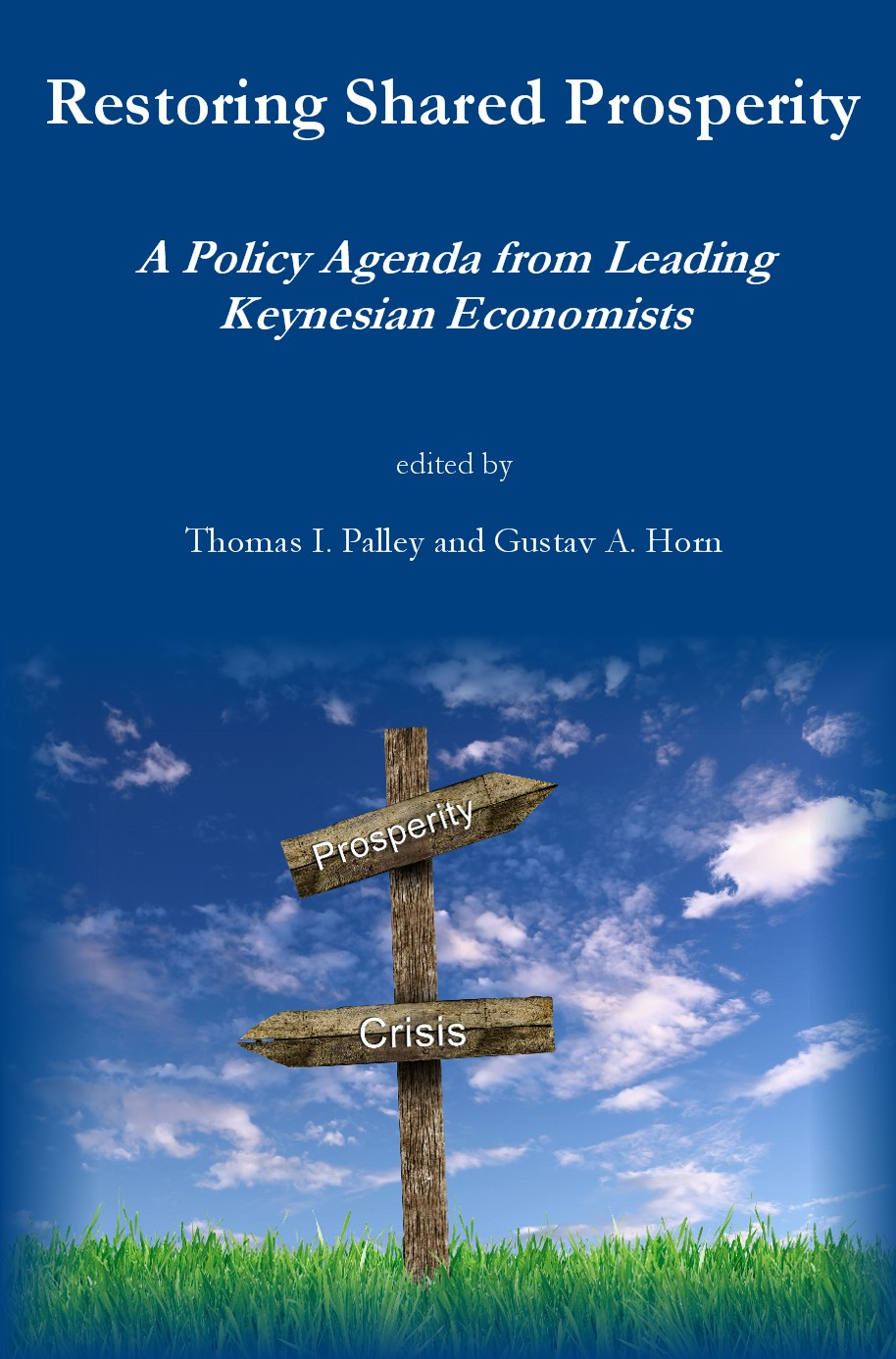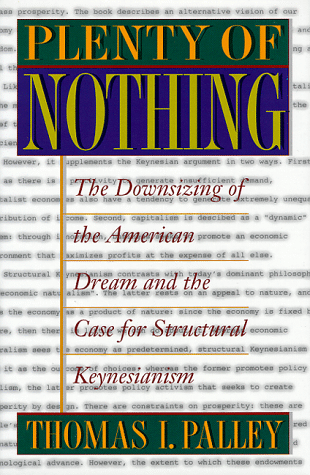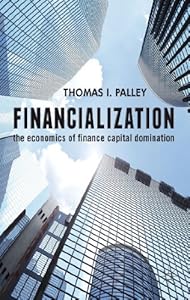Books
 Restoring Shared Prosperity: A Policy Agenda from Leading Keynesian Economists. Editors: Thomas I. Palley and Gustav A. Horn. The economic recovery in the US since the Great Recession has remained sub-par and beset by persistent fear it might weaken again. Even if that is avoided, the most likely outcome is continued weak growth, accompanied by high unemployment and historically high levels of income inequality. In Europe, the recovery from the Great Recession has been even worse, with the euro zone beset by an unresolved euro crisis that has already contributed to a double-dip recession in the region. This book offers an alternative agenda for shared prosperity to that on offer from mainstream economists. The thinking is rooted in the Keynesian analytic tradition, which has been substantially vindicated by events. However, pure Keynesian macroeconomic analysis is supplemented by a focus on the institutions and policy interventions needed for an economy to generate productive full employment with contained income inequality. Such a perspective can be termed “structural Keynesianism”. These are critical times and the public deserves an open debate that does not arbitrarily or ideologically lock out alternative perspectives and policy ideas. The book contains a collection of essays that offer a credible policy program for shared prosperity, rooted in a clear narrative that cuts through the economic confusions that currently bedevil debate.
Restoring Shared Prosperity: A Policy Agenda from Leading Keynesian Economists. Editors: Thomas I. Palley and Gustav A. Horn. The economic recovery in the US since the Great Recession has remained sub-par and beset by persistent fear it might weaken again. Even if that is avoided, the most likely outcome is continued weak growth, accompanied by high unemployment and historically high levels of income inequality. In Europe, the recovery from the Great Recession has been even worse, with the euro zone beset by an unresolved euro crisis that has already contributed to a double-dip recession in the region. This book offers an alternative agenda for shared prosperity to that on offer from mainstream economists. The thinking is rooted in the Keynesian analytic tradition, which has been substantially vindicated by events. However, pure Keynesian macroeconomic analysis is supplemented by a focus on the institutions and policy interventions needed for an economy to generate productive full employment with contained income inequality. Such a perspective can be termed “structural Keynesianism”. These are critical times and the public deserves an open debate that does not arbitrarily or ideologically lock out alternative perspectives and policy ideas. The book contains a collection of essays that offer a credible policy program for shared prosperity, rooted in a clear narrative that cuts through the economic confusions that currently bedevil debate.
Contributions by Richard L Trumka, Thomas I Palley, Gustav A Horn, Andreas Botsch, Josh Bivens, Achim Truger, Jared Bernstein, Robert Pollin, Dean Baker, Gerald Epstein, Damon Silvers, Jennifer Taub, Silke Tober, Jan Priewe, John Schmidt, Heidi Shierholz, William E Spriggs, Eckhard Hein, Heiner Flassbeck, Gerhard Bosch, Michael Dauderstädt
The book is available for $7.52 at AMAZON.COM
Financialization: The Economics of Finance Capital Domination
by Thomas Palley, Palgrave Macmillan, May 2013
This book explores the process of financialization whereby economies are increasingly dominated by finance capital. This process is characterized by rising income inequality, wage stagnation, increased indebtedness, a rising financial sector share of profits, and tendencies to generate asset price bubbles. The financial crisis of 2008 and the subsequent recession and stagnation represent the latest phase. The book provides a comprehensive treatment of these developments, beginning with a presentation of the empirical evidence. That is followed by economic theory chapters dealing with the macroeconomics of financialization; business cycle effects; microeconomic developments; tendencies toward Minsky-style economic instability; and economic growth effects. The final section of the book focuses on the political economy of financialization and policies to stabilize financial markets.
EUROPE, AFRICA, LATIN AMERICA:
A 50% discount is available at www.palgrave.com with discount code WPALLEY2013a.
NORTH AMERICA, AUSTRALASIA:
A 20% discount is available at www.amazon.com. Also available at www.palgrave-usa.com with discount code XP356ED.

The Economic Crisis: Notes from the Underground
by Thomas I. Palley, Createspace, 2012
This book provides a collection of short essays detailing the causes of the economic crisis and the failure of the economics profession to foresee and explain it. An old adage is “The winners get to write history” and that is proving true in the current moment. Open any major newspaper and the op-ed page contains articles by the same economists and policymakers as before the financial crash of 2008. One myth the winners are looking to promulgate is the crisis was not predicted and not predictable. This claim has a purpose as it excuses the economics profession from its catastrophic intellectual failure. The book challenges this “winners’ version of history” by showing the crisis was predictable and foreseen. The articles provide easy access to both theoretical and policy controversies that continue to be important, and they also show little has been done to fix the root problems. The academy is a club and it resists change because club members benefit from their intellectual monopoly. This monopoly means politicians are all fed roughly the same policy diet. Politicians are also subject to the pull of money and money likes the existing mainstream economic paradigm. Together, this constitutes a powerful sociological system that is hard to crack. Part of cracking it is exposing the failure of economists by showing the crisis was foretold and predicted.
Buy this book. List price $9.99
From Financial Crisis to Stagnation
by Thomas Palley, Cambridge University Press, 2012.
The U.S. economy today is confronted with the prospect of extended stagnation. This book explores why. Thomas I. Palley argues that the Great Recession and destruction of shared prosperity is due to flawed economic policy over the past thirty years. One flaw was the growth model adopted after 1980 that relied on debt and asset price inflation to fuel growth instead of wages. A second flaw was the model of globalization that created an economic gash. Third, financial deregulation and the house price bubble kept the economy going by making ever more credit available. As the economy cannibalized itself by undercutting income distribution and accumulating debt, it needed larger speculative bubbles to grow. That process ended when the housing bubble burst. The earlier post–World War II economic model based on rising middle-class incomes has been dismantled, while the new neoliberal model has imploded. Absent a change of policy paradigm, the logical next step is stagnation. The political challenge we face now is how to achieve paradigm change.
Buy this book. List price $60. A 20% discount is available when you purchase using this discount code. [Select country location & enter code “palley2012” at checkout to get the discount]

Plenty of Nothing: The Downsizing of the American Dream and the Case for Structural Keynesianism,
by Thomas Palley, Princeton University Press, 1998. paperback edition, 2000.
Business papers today are in a triumphant mood, buoyed by a conviction that the economic stagnation of the last quarter century has vanished in favor of a new age of robust growth. But if we are doing so well, many ask, why does it feel like we are working harder for less? Why, despite economic growth, does inequality between rich and poor keep rising? In this wide-ranging and provocative book, Thomas Palley pulls together many threads of “new liberal” economic thought to offer detailed answers to these pressing questions. And he proposes a new economic model–structural Keynesianism–that he argues would return America to sustainable, fairly shared prosperity. The key, he writes, is to abandon the myth of a natural competitive economy, which has justified unleashing capital and attacking unions. This has resulted in an economy dominated by business.
Palley’s book, which began as a cover article for The Atlantic Monthly in 1996, challenges the economic orthodoxies of the political right and center, popularized by such economists as Milton Friedman and Paul Krugman. He marshals a powerful array of economic facts and arguments to show that the interests of working families have gradually been sacrificed to those of corporations. Expanding on traditional Keynesian economics, he argues that, although capitalism is the most productive system ever devised, it also tends to generate deep economic inequalities and encourage the pursuit of profit at the expense of all else. He challenges fatalists who say we can do nothing about this–that economic insecurity and stagnant wages are the inevitable results of irresistible globalization. Palley argues that capitalism comes in a range of forms and that government can and should shape it from a “mean street” system into a “main street” system through monetary, fiscal, trade, and regulatory policies that promote widespread prosperity.
Plenty of Nothing offers a compelling alternative to conventional economic wisdom. The book is clearly and powerfully written and will provoke debate among economists and the general public about the most stubborn problems in the American economy.
Buy this book. List Price $37.50

Post Keynesian Economics: Debt, Distribution, and the Macro Economy, Macmillan Press, 1996. Paperback edition, 1996.
